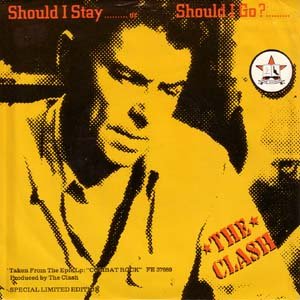Burning questions about teaching English in China #10: Should it stay or should it go?
So far, I have only discussed common errors in spelling and usage. Here's a pronunciation puzzler.
Puzzler #10: Why do some students add an extra “uh” to the end of words that don’t require it, while other students leave it off from words that do?
I’ll provide some examples, so you can see what I mean.
The extra “uh” /ə/:
I forgot to pay the rent-uh. /rentə/
My mother sent me to the market to buy some egg-uh-suh. /’eg ə sə/
The missing last syllable:
By the time I am 30, I want to visit Americ, Europe and Afric.
To learn English well, you should also study British cultch.
Modern technolidge has made life more convenient.
To repeat my refrain again, I’ve heard dozens of students make these pronunciation errors, so it’s not just one particular student in each case. The first is more common, given that Chinese has few words that end in consonants, which is easy to understand. The second is just infuriating.
English is one of several languages that include words that end in “hard” consonants, such as d, t, k, p, b, f or v. For speakers of languages with words that usually end in vowels (a, e, i, o, u) or “soft” consonants like /n/, /m/ or /ŋ/*, remembering to stop at that last consonant can be difficult. From force of habit, they want to add a sound at the end. Speakers of Spanish and Italian, for example, often add an extra syllable at the end of English words, if they only recently have learned to speak English.
Regardless of the reasons, it is imperative that students learn NOT to add extra vowels at the end of words that don’t require them, ESPECIALLY if they are English majors. Teachers need to immediately correct students who add that extra “uh” on the end of English words, preferably while the students are young. Otherwise, as they get older, the habit will be hard to lose. Significantly, I have found my university students who add that extra “uh” don’t even hear it when they say it. Even when I point it out, they don’t realize they are saying it.
As for the other side of the coin, I really don’t understand why some students leave off the final syllables of words that REQUIRE them. It is “Americ-a”, not “Americ,” “Afric-a,” not “Afric,” “culture,” not “cultch,” “technolog-ee” not “technolidge.” This is true whether one prefers American English or British English. The Brits may drop the final “r” in “culture,” but the final syllable is still there. To a native speaker, not hearing that last syllable just sounds very, very strange, and it suggests the speaker’s command of English is just not very good.
So, here’s a rule of thumb, though beware of many exceptions!
If an English word ends in any vowel besides “e”, you HAVE to pronounce the vowel.
As for our friend, the final "e", most of the time – but not all the time – the final “e” in an English word is silent (or unvoiced). The exceptions are generally words borrowed from other languages, especially French or Spanish. Sometimes, an extra mark is added to a final “e” to indicate that it is voiced.
Charlotte Brontë – the English author’s family name has two syllables. Her given name, Charlotte, also has two syllables – that last “e” is silent.
Résumé, fiancé, fiancée – these are loanwords from French, and the accent mark over the “e” means the vowel is voiced. (French also has a silent final e, which does not have a diacritical mark. For example, "melange" /meɪˈlɒ̃ʒ/ is a word in French and English meaning "blend or mixture."
Guacamole, calle - these words from Spanish don't have diacritical marks over the final "e," but in Spanish the final vowel is always voiced. /gwa:k a MO le/ is a kind of sauce made with avocados. /KAI je/ is the word for "street."
Hundreds of years ago, English did have a voiced final “e”, but over time it lost its power, so to speak. Instead, it became an indication that the vowel before it was to be “long.” For example:
hat /hæt/
hate /heit/ – In early Middle English, this word would have been pronounced more like /’ha: tə / with two syllables, which later became /ha:t / (one syllable), and following the Great Vowel Shift (1300-1600), became /heit/ – the “long e”.
The final silent “e” can also indicate a change in a consonant, particularly the phones spelled with “th.”
bath /bæθ/ (American English)
bathe /beið/ – both the vowel and the final consonant change!
It is impossible to state universal rules of spelling and pronunciation in English, because it is a melange of various languages. Even we native speakers have trouble sorting it all out!
When in doubt, refer to a good dictionary or ask a native speaker! And when a word ends in a consonant, please don’t add extra syllables!
- Mandarin has words ending in /n/ and /ŋ/, but not /m/. So, some students replace the /m/ with /ŋ/ or /n/, which I try to correct as often as possible. Usually, though, they do not add an extra “uh” on the end.
This week's musical connection is "Should I Stay or Should I Go?" by The Clash, released in 1981. It has nothing to do with final "e" however.
